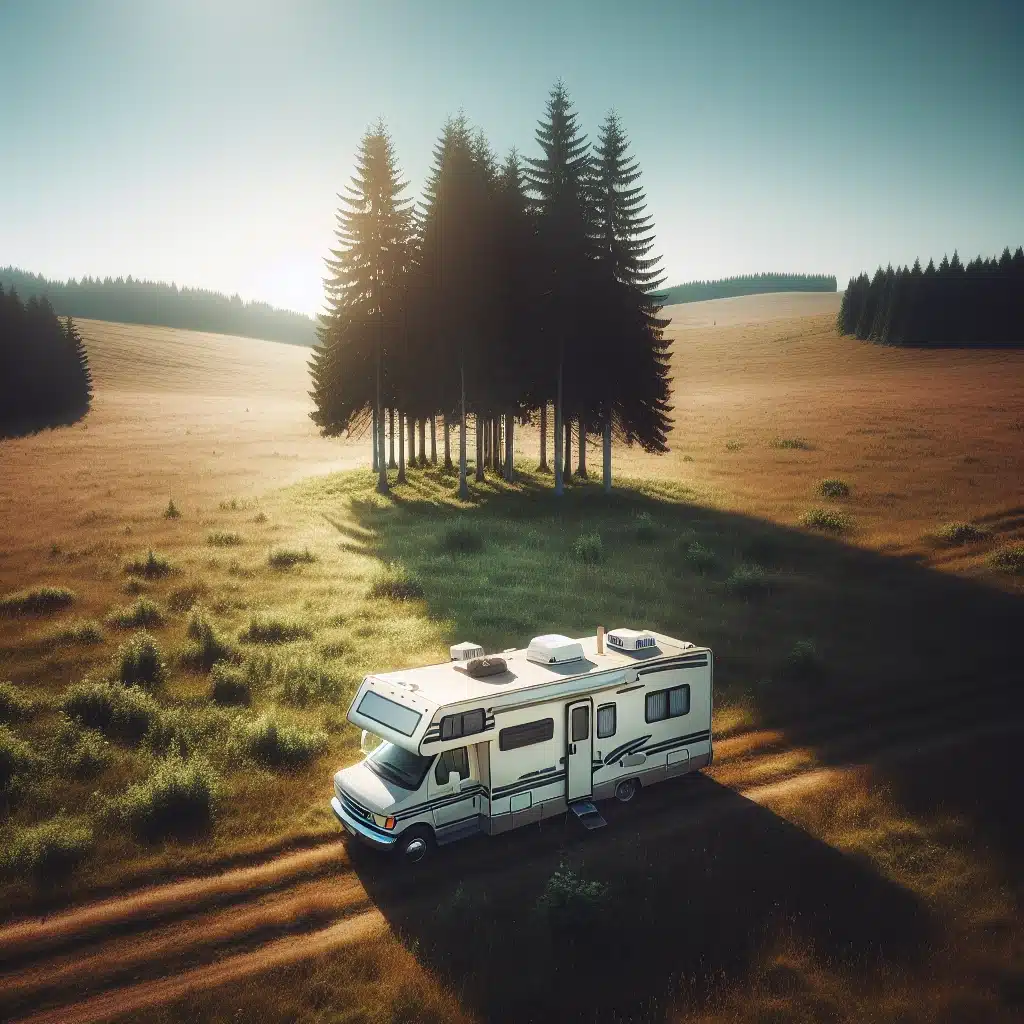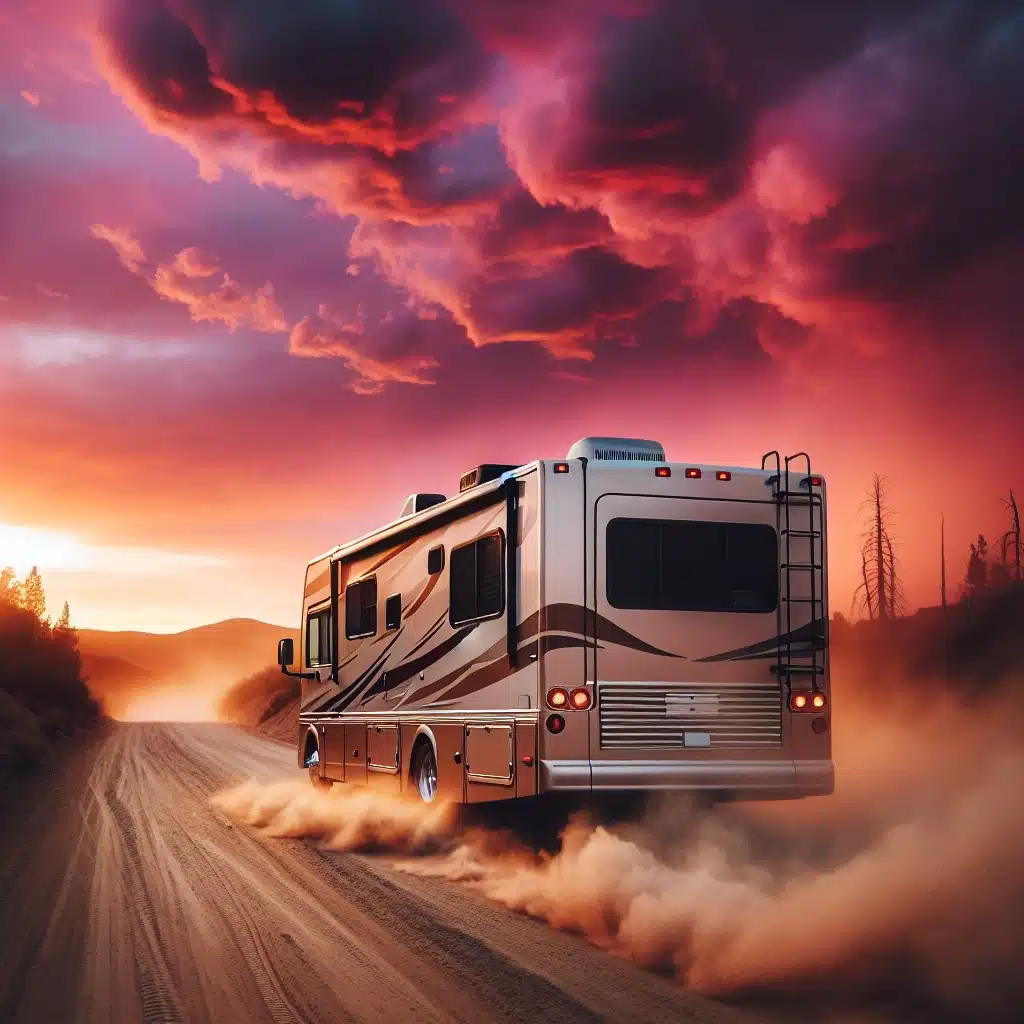Table of Contents

Embracing the Sun: The Shift to Solar Power RVs
Imagine hitting the road where your only checkpoint is the horizon and your fuel comes from the sky above. That’s the freedom solar power brings to RV travel. With the sun as your co-pilot, you’re no longer tethered to power grids and gas stations. This shift towards solar power isn’t just a trend; it’s a movement among RV owners who crave independence and care for the planet.
Article-at-a-Glance
- Solar power is revolutionizing RV travel, offering freedom and eco-friendliness.
- Understanding the why and how of solar RVs is simpler than you might think.
- Going solar can slash your travel costs and reduce your environmental impact.
- Discover the core benefits and the inner workings of a solar-powered RV setup.
- Learn practical tips for choosing, installing, and maintaining your RV’s solar system.
Why Solar Power RVs Make Sense
Let’s get to the heart of the matter. Solar power for RVs is more than just a way to charge your batteries; it’s a lifestyle choice. By harnessing the sun’s energy, you’re saying yes to self-sufficiency and no to the constraints of traditional camping. Here’s the scoop on why solar power and RVs are a match made in heaven:
- **Unlimited Power Source:** The sun doesn’t send you a bill. Once you’ve set up your solar panels, the energy is free.
- **Eco-Friendly:** Solar power is clean, renewable, and doesn’t contribute to pollution.
- **Quiet Operation:** Forget the rumble of a generator; solar panels work silently.
- **Low Maintenance:** Solar systems have fewer moving parts, which means less can go wrong.
- **Off-Grid Living:** With solar power, you can camp anywhere the sun shines, without needing hookups.
The Green Adventure: Benefits of Solar RV Travel
The allure of the open road gets even sweeter when you add solar power into the mix. It’s not just about doing good for the environment; it’s about enhancing your travel experience in ways you might not have imagined. Here’s how going green can make your adventures even more rewarding:
Cutting Costs on the Open Road
One of the most compelling reasons to go solar is the cost savings. After the initial setup, the sun’s energy is essentially free, which means you can forget about the ongoing costs of fuel and campground fees. Here’s how solar keeps more money in your pocket:
- **Zero Fuel Costs:** Say goodbye to the constant expense of gas or diesel to power a generator.
- **Reduced Campground Fees:** With the ability to generate your own power, you can skip the pricier campsites with electrical hookups.
- **Minimal Maintenance:** Solar systems require less upkeep than traditional RV power sources, saving you on maintenance costs.
- **Increased RV Value:** Adding a solar setup can increase the resale value of your RV.
Reducing Your Carbon Wheelprint
Every time you choose solar power over fossil fuels, you’re taking a stand for the planet. RV travel can be a significant source of carbon emissions, but it doesn’t have to be. Solar power is a game-changer, drastically cutting down your carbon footprint. Here’s the impact you could make:
- **Clean Energy:** Solar panels produce zero emissions, unlike gas-powered generators.
- **Renewable Resource:** The sun provides a limitless supply of energy, reducing the need for finite fossil fuels.
- **Sustainable Lifestyle:** By choosing solar, you’re part of a growing community committed to preserving our natural world.
With these points in mind, it’s clear that solar power and RVs are a perfect pairing for those who love the road and the earth. Stay tuned as we dive deeper into how you can make the switch to a solar-powered RV, ensuring your adventures are both memorable and responsible.
Maintaining Nature’s Peace and Quiet
There’s something magical about waking up to the sounds of nature rather than the hum of a generator. Solar panels invite you to preserve the tranquility of the great outdoors. They operate silently, allowing you to enjoy the soft whisper of the wind and the melody of birds without interruption. It’s about keeping your surroundings as serene as they were meant to be, enhancing your connection to nature and providing a more authentic camping experience.

Inside a Solar-Powered RV: How it Works
Stepping into a solar-powered RV feels like entering a vessel of the future. But the technology is here, and it’s surprisingly straightforward. The system captures sunlight and converts it into electricity, which powers everything in your RV from lights to appliances. Let’s break down the magic behind the scenes and see how simple it can be.
The Solar Setup: Panels, Batteries, and Inverters
- Solar Panels: These are your power collectors, installed on the roof of your RV. They absorb sunlight and produce direct current (DC) electricity.
- Charge Controller: This device regulates the flow of electricity to the batteries, ensuring they charge properly and aren’t overcharged.
- Batteries: They store the energy collected by your panels so you can use it even when the sun isn’t shining.
- Inverter: Most RV appliances run on alternating current (AC), so the inverter converts the DC electricity from your batteries into AC.
With these components working together, you’ve got a fully functional solar power system that can take you anywhere the sun shines.
Managing Energy: Storage and Consumption
It’s all about balance. Managing your energy storage and consumption ensures you have power when you need it. Here’s how you can keep the scales tipped in your favor:
- Monitor Your Usage: Keep an eye on how much power you’re using. Energy-efficient appliances and LED lighting can help reduce consumption.
- Understand Your Batteries: Know the capacity of your battery bank and how much power you typically need each day.
- Plan for the Weather: Cloudy days will affect your solar intake, so plan ahead to conserve energy when the forecast isn’t sunny.
By staying aware and making smart choices, you can maximize your energy efficiency and enjoy uninterrupted power.
Staying Powered Up: Maintenance Tips for Your Solar System
- Keep Panels Clean: Dust and debris can block sunlight. Regularly cleaning your panels ensures they’re operating at peak efficiency.
- Check Connections: Loose wires can lead to power loss. Inspect your system’s connections to ensure everything is secure.
- Battery Care: Batteries have a lifespan. Maintain them according to the manufacturer’s guidelines to prolong their life.
- Update Firmware: If your system has a digital controller, keep its software updated for the latest efficiency improvements.
With these simple maintenance steps, you can keep your solar system running smoothly for years to come.
Riding Into the Future: Advanced Solar RV Features
As solar technology advances, so do the features available for your RV. We’re talking about systems that not only power your journey but also adapt to your needs and the environment. From smart monitoring systems that provide real-time energy stats to automated panel positioners that track the sun, the future of solar RVing is bright and full of potential.
Smart Solar: Technology Enhancements in RV Solar Systems
Modern solar systems are smarter than ever. They’re equipped with technology that not only boosts performance but also gives you unparalleled control over your energy use. Think Bluetooth connectivity, remote monitoring, and even apps that let you manage your system with a tap on your smartphone. Here’s a glimpse into the tech that’s driving smart solar:
- Monitoring Apps: Apps that sync with your system to track energy production and consumption in real-time.
- Automated Controllers: Devices that optimize battery charging and prevent overcharging, prolonging battery life.
- MPPT Charge Controllers: These maximize the energy harvest from your panels by adjusting the electrical operating point.
- Weather Prediction Integration: Systems that adjust energy usage based on upcoming weather changes.
With these advancements, you’re not just traveling with solar power; you’re cruising with a high-tech companion that’s looking out for you and your energy needs.
Off-Grid Independence: How Solar Maximizes Travel Potential
One of the biggest draws to solar power is the promise of off-grid freedom. With a solar-equipped RV, you’re no longer searching for the next plug-in point; you’re self-reliant. Solar power opens up a world of remote and untouched destinations, places where you can be one with nature without sacrificing the comforts of home. This is what true travel independence feels like:
- Limitless Locations: Park anywhere from a forest clearing to a desert landscape, all while having full power.
- Extended Trips: With the ability to recharge your batteries daily, you can stay off-grid for longer periods.
- Emergency Readiness: In case of emergencies, your solar system can be a reliable source of power when other options fail.
Embrace the freedom solar power offers, and let your adventurous spirit lead the way.

Choosing the Right Solar Power Setup for Your RV
Selecting the right solar power setup for your RV is crucial. It’s not a one-size-fits-all situation; it’s about finding the perfect match for your energy needs and travel style. To ensure you’re making the best choice, consider these factors:
Evaluating Your Energy Needs
Before diving into solar, take stock of your energy needs. How much power do you use daily? What appliances are essential for your comfort? Here’s a straightforward approach to figure it out:
- List Your Appliances: Write down everything that needs power in your RV, from lights to the fridge.
- Calculate Usage: Check the wattage of each appliance and estimate how long you use them each day.
- Add It Up: Multiply the wattage by the hours of use to get your daily watt-hour total.
With this total, you’ll have a clear picture of your energy needs and can size your solar system accordingly.
Comparing Solar Panel Types and Brands
Not all solar panels are created equal. There are different types, such as monocrystalline, polycrystalline, and thin-film, each with its own advantages. When comparing brands, look for reliability, efficiency, and warranty. Here’s a quick guide:
- Monocrystalline: High efficiency and durability, ideal for limited roof space.
- Polycrystalline: Lower cost with a slight reduction in efficiency.
- Thin-Film: Flexible and lightweight, but generally less efficient.
- Brand Reputation: Choose brands with a proven track record and positive reviews.
Take the time to research and compare; your solar panels are the backbone of your system.
Installation: DIY vs. Professional Help
Installing a solar power system can be a DIY project, but it’s not for everyone. If you’re handy and understand electrical systems, you might enjoy the challenge. But, if you’re not confident, there’s no shame in calling in the pros. Consider these points:
- DIY: It can save you money and give you a deep understanding of your system.
- Professional Help: Experts can ensure a safe and optimized installation, often with added warranty protection.
- Time vs. Cost: Weigh the time investment of DIY against the cost of professional services.
Whether you go DIY or hire a pro, the key is a safe and efficient setup that’s ready for the road.
Overcoming Challenges: Tips for Optimizing Solar Efficiency
While solar power brings a host of benefits, it’s not without its challenges. But don’t worry, with a few smart strategies, you can optimize your solar efficiency and keep the power flowing, no matter what Mother Nature throws your way.
Dealing with Inclement Weather and Low Light Conditions
Cloudy skies and rainy days can put a damper on your solar energy harvest. Here’s how to stay powered up when the sun is playing hide and seek:
- Angle Your Panels: Adjusting the tilt of your panels can help capture more light during cloudy days.
- Use a Larger Battery Bank: Having extra storage capacity means you can stockpile energy on sunny days to use when the weather turns.
- Add a Backup Generator: For those times when the sun just won’t show, a small generator can be a good backup.
- Energy Conservation: Be mindful of your usage. Turn off non-essential devices and use energy-efficient appliances.
By preparing for less-than-ideal weather, you can ensure a steady supply of power to your RV.
Maximizing Energy Efficiency on the Move
Traveling in an RV doesn’t mean your solar efficiency has to take a back seat. Keep these tips in mind to maintain high energy efficiency on the go:
- Plan Your Route: Traveling during peak sunlight hours maximizes your charging potential.
- Regular Maintenance: Keep your solar panels clean and check connections to avoid power loss.
- Upgrade Insulation: Better insulation means less energy spent on heating and cooling your RV.
- Use Natural Ventilation: Open windows and vents to cool down instead of relying on air conditioning.
With these practices, you can keep your solar system running efficiently, even while you’re on the move.
Tapping into Solar Savings: Budgeting for Your Solar RV
Investing in a solar-powered RV setup can be a significant financial decision. But with a clear understanding of the costs and savings, you can make an informed choice that pays off in the long run.
Understanding the Upfront Costs
The initial investment in solar can seem steep, but it’s important to consider what’s included. Here’s a breakdown of what you’ll be spending money on:
- Solar Panels: The number and type of panels will influence the cost.
- Battery Bank: Quality batteries are crucial for storing the energy you collect.
- Inverter: This converts solar power into usable energy for your RV’s appliances.
- Installation: Whether you do it yourself or hire a professional, there will be costs for materials and labor.
Remember, the upfront cost is an investment in your travel freedom and in reducing your ongoing expenses.
Calculating Long-Term Savings
While the initial setup cost is important, don’t forget to calculate the long-term savings solar power will bring. Here’s how to see the bigger financial picture:
- No More Fuel Costs: The savings on gas or diesel for generators can be substantial over time.
- Reduced Campground Fees: Being able to stay off-grid means you can avoid expensive campground fees with electrical hookups.
- Low Maintenance: Solar systems typically require less upkeep than traditional power sources, saving you money on repairs and replacements.
- Increased RV Value: A solar setup can increase the resale value of your RV, offering a return on your investment.
By considering both the upfront costs and the long-term savings, you’ll see how solar power can be a smart financial move for your RV lifestyle.
Frequently Asked Questions (FAQ)
How long do RV solar panels last?
Quality solar panels are built to last. Most manufacturers offer warranties of 25 years, and it’s not uncommon for panels to keep kicking even beyond that. Of course, this depends on how well you maintain them. Keep them clean, check for any physical damage periodically, and they’ll serve you faithfully for decades.
Can I run my RV air conditioner on solar power?
Running an air conditioner on solar power is possible, but it requires a hefty solar setup. Air conditioners are energy hogs, so you’ll need a substantial number of panels and a large battery bank to keep cool on solar power alone. It’s all about having enough stored energy to handle the high power draw without draining your batteries dry.
Is it possible to completely rely on solar power for my RV needs?
Yes, it’s entirely possible to rely on solar power for all your RV needs, but it requires careful planning. You’ll need to assess your energy consumption, have an adequately sized solar panel array, and enough battery capacity to store the energy. Plus, you should have a backup plan for those days when the sun decides to play hide-and-seek.
How do I calculate how much solar power I need for my RV?
To calculate your solar power needs, start by listing all your electrical devices and how many hours you use them daily. Then, find out each device’s wattage and multiply it by the hours of use to get the watt-hours. Add up the watt-hours for all devices to get your daily consumption. With this total, you can determine the size of the solar panel array and battery bank you’ll need.
– Device Wattage: Check the user manual or product label for power consumption info.
– Hours of Use: Be realistic about how long you use each device.
– Total Watt-Hours: Sum the watt-hours for a day, then for how many days you want to go without recharging.
What maintenance is required for RV solar power systems?
Maintenance for RV solar power systems is minimal but important. Regularly clean your solar panels to ensure maximum efficiency. Check all electrical connections for corrosion or wear and tear. Monitor your batteries’ health, keeping them charged and avoiding deep discharges. Finally, update any software for charge controllers or monitoring systems to ensure they’re running optimally.
With these FAQs addressed, you’re armed with the knowledge to embark on your solar-powered RV journey. Remember, the road to sustainable travel is an ongoing adventure, and as you learn and adapt, your experiences will only enrich. Solar power for RVs isn’t just about saving money or being eco-friendly; it’s about embracing a lifestyle that brings you closer to the freedom of the open road and the natural world around you.
As you consider the switch to solar, think of the sunrises you’ll witness and the remote places you’ll explore, all with the peace of mind that you’re treading lightly on the earth. The journey towards a sustainable, solar-powered RV life is as rewarding as the destinations you’ll visit. So go ahead, harness the power of the sun, and let it propel you to adventures untold.
- Boondocking RVs: Flexible Solar Solutions – 3 March 2024
- Renewable Energy Tips for Full-Time Boondocking RVers – 2 March 2024
- Boondocking Solar Power Systems: Sizing Options & Solutions for Motorhomes – 1 March 2024
